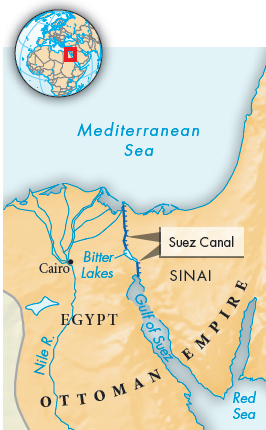Egypt: From Reform to British Occupation
Egypt had been ruled by a succession of foreigners from 525 B.C.E.to the Ottoman conquest in the early sixteenth century. In 1798, as France and Britain prepared for war in Europe, Napoleon Bonaparte invaded Egypt, thereby threatening British access to India, and occupied the territory for three years. Into the power vacuum left by the French withdrawal stepped an extraordinary Albanian-
Appointed Egypt’s governor in 1805, Muhammad Ali set out to build his own state on the strength of a large, powerful army organized along European lines. He also reformed the government and promoted modern industry. (See “Individuals in Society: Muhammad Ali.”) For a time Muhammad Ali’s ambitious strategy seemed to work, but it eventually foundered when his armies occupied Syria and he threatened the Ottoman sultan, Mahmud II. In the face of European military might and diplomatic entreaties, Muhammad Ali agreed to peace with his Ottoman overlords and withdrew. In return he was given unprecedented hereditary rule over Egypt and Sudan. By his death in 1849, Muhammad Ali had established a strong and virtually independent Egyptian state within the Ottoman Empire.
To pay for a modern army and industrialization, Muhammad Ali encouraged the development of commercial agriculture geared to the European market, which had profound social implications. Egyptian peasants had been largely self-
Muhammad Ali’s modernization policies attracted growing numbers of Europeans to the banks of the Nile. Europeans served as army officers, engineers, doctors, government officials, and police officers. Others worked in trade, finance, and shipping. Above all, Europeans living in Egypt combined with landlords and officials to continue steering commercial agriculture toward exports. As throughout the Ottoman Empire, Europeans enjoyed important commercial and legal privileges and formed an economic elite.

Following in his grandfather’s footsteps, Ismail (r. 1863–
Major cultural and intellectual changes accompanied the political and economic ones. The Arabic of the masses, rather than the conqueror’s Turkish, became the official language, and young, European-
Three influential figures who represented broad families of thought were especially significant. The teacher and writer Jamal al-
Finally, the writer Qasim Amin (1863–
Egypt changed rapidly during Ismail’s rule, but his projects were reckless and enormously expensive. By 1876 the Egyptian government could not pay the interest on its debt. Rather than let Egypt go bankrupt and repudiate its loans, France and Great Britain intervened, forcing Ismail to appoint French and British commissioners to oversee Egyptian finances. This meant that Europeans would determine the state budget and in effect rule Egypt.
Foreign financial control evoked a violent nationalistic reaction. Continuing diplomatic pressure, which forced Ismail to abdicate in favor of his weak son, Tewfiq (r. 1879–
Initially the British maintained the fiction that Egypt was an autonomous province of the Ottoman Empire. In reality, British consul, General Evelyn Baring, later Lord Cromer, ruled the country after 1883. Baring was a paternalistic reformer. He initiated tax reforms and made some improvements to conditions for peasants. Foreign bondholders received their interest payments, while Egyptian nationalists chafed under foreign rule.
>QUICK REVIEW
How did European nations undermine reform efforts in the Ottoman Empire and in Egypt?